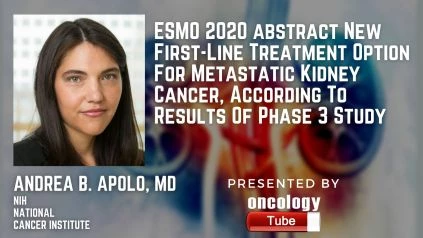Andrea B. Apolo, MD of NIH National Cancer Institute speaks about the ESMO 2020 abstract New First-Line Treatment Option For Metastatic Kidney Cancer, According To Results Of Phase 3 Study.
LUGANO, Switzerland-For patients with metastatic kidney cancer, the findings of the phase 3 CheckMate 9ER trial have provided a potential first-line treatment choice. At ESMO 2020, the late break results are discussed. (1)
The research took two second-line monotherapy medications, nivolumab, and cabozantinib, and merged them for use as a first-line standard-of-care drug, sunitinib. The combination was superior for progression-free survival, overall survival, and response rate compared to sunitinib. In various subgroups, including age, gender, PD-L1 expression, bone metastases, the International Metastatic RCC Database Consortium (IMDC) risk group, and world zone, the combination has consistently benefited from sunitinib.
Due to adverse effects, more than 50 percent of patients in the combination arm required a dose reduction of cabozantinib. But as opposed to 9 percent of patients in the sunitinib arm, only 3 percent had to avoid both drugs due to toxicity. The overall incidence of severe adverse effects between the arms was comparable, but liver toxicity in the combination arm was more common. As for immune-related side effects, 19% of patients in the experimental arm required corticosteroids; for 30 days or longer, only 4% required corticosteroids.
The results lead to mounting evidence illustrating the benefits of combination therapy over single medications. The KEYNOTE-426 and JAVELIN Renal 101 trials (2,3) combined an immune checkpoint inhibitor with an anti-angiogenic drug in a similar way to the CheckMate 9ER experiment, while CheckMate 214 combined two immune checkpoint inhibitors. (4)

